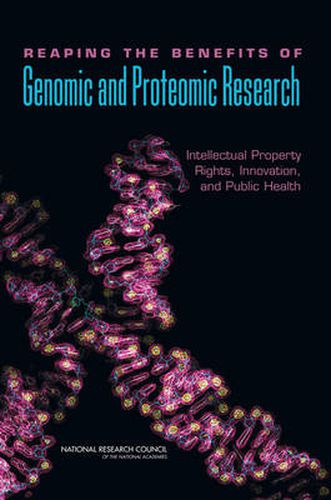Readings Newsletter
Become a Readings Member to make your shopping experience even easier.
Sign in or sign up for free!
You’re not far away from qualifying for FREE standard shipping within Australia
You’ve qualified for FREE standard shipping within Australia
The cart is loading…






The patenting and licensing of human genetic material and proteins represents an extension of intellectual property (IP) rights to naturally occurring biological material and scientific information, much of it well upstream of drugs and other disease therapies. This report concludes that IP restrictions rarely impose significant burdens on biomedical research, but there are reasons to be apprehensive about their future impact on scientific advances in this area. The report recommends 13 actions that policy-makers, courts, universities, and health and patent officials should take to prevent the increasingly complex web of IP protections from getting in the way of potential breakthroughs in genomic and proteomic research. It endorses the National Institutes of Health guidelines for technology licensing, data sharing, and research material exchanges and says that oversight of compliance should be strengthened. It recommends enactment of a statutory exception from infringement liability for research on a patented invention and raising the bar somewhat to qualify for a patent on upstream research discoveries in biotechnology. With respect to genetic diagnostic tests to detect patient mutations associated with certain diseases, the report urges patent holders to allow others to perform the tests for purposes of verifying the results.
$9.00 standard shipping within Australia
FREE standard shipping within Australia for orders over $100.00
Express & International shipping calculated at checkout
The patenting and licensing of human genetic material and proteins represents an extension of intellectual property (IP) rights to naturally occurring biological material and scientific information, much of it well upstream of drugs and other disease therapies. This report concludes that IP restrictions rarely impose significant burdens on biomedical research, but there are reasons to be apprehensive about their future impact on scientific advances in this area. The report recommends 13 actions that policy-makers, courts, universities, and health and patent officials should take to prevent the increasingly complex web of IP protections from getting in the way of potential breakthroughs in genomic and proteomic research. It endorses the National Institutes of Health guidelines for technology licensing, data sharing, and research material exchanges and says that oversight of compliance should be strengthened. It recommends enactment of a statutory exception from infringement liability for research on a patented invention and raising the bar somewhat to qualify for a patent on upstream research discoveries in biotechnology. With respect to genetic diagnostic tests to detect patient mutations associated with certain diseases, the report urges patent holders to allow others to perform the tests for purposes of verifying the results.